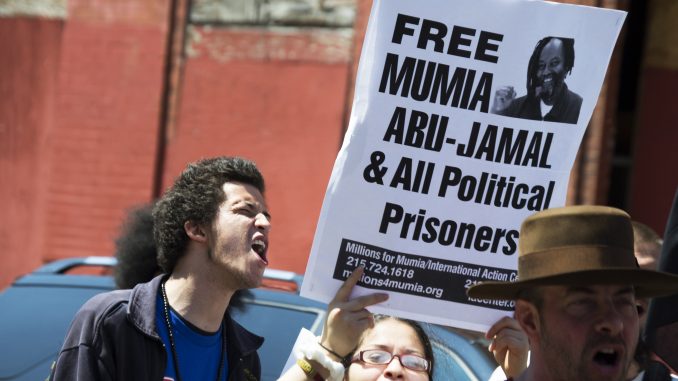
More than 200 supporters of Mumia Abu-Jamal held a march on Saturday from the former Philadelphia headquarters of the Black Panther movement to the Church of the Advocate, calling for Abu-Jamal’s release and against gentrification in North Philadelphia’s community.
Protestors at the Sons and Daughters of the Revolution March argued the historic Black Panther headquarters on the 1900 block of Cecil B. Moore Avenue, of which Abu-Jamal was a member, is in threat due to encroaching gentrification. The event was held as part of a weekend celebration of Abu-Jamal’s 60th birthday on April 24.
In 1982 Abu-Jamal was convicted for the murder of Philadelphia police officer Daniel Faulkner and sentenced to death. His supporters claim he is a political prisoner as a result of his radical radio broadcasts during the 1970s.
Abu-Jamal spent 18 years on Pennsylvania’s death row before his death sentence was overturned in December 2001. In 2011 Abu-Jamal was given life in prison without possibility of parole, which he is serving at the State Correctional Institution – Mahanoy in Frackville, Pa.
Faulkner had worked for the Philadelphia Police Department for five years before his murder, and his death has received support from the Fraternal Order of Police and members of Congress. Abu-Jamal’s conviction is supported by the City of Philadelphia and the Commonwealth of Pennsylvania, as well.

FOP Lodge 5 in Philadelphia has been advocating for Faulkner’s case, creating a Facebook page in 2011 called “Justice for Daniel Faulkner.” The FOP could not be reached for comment, and the Philadelphia Police Department declined to comment on the rally.
Around 10:30 a.m. on Saturday morning, dressed in reds, yellows and greens, groups from the United African Movement, Alumni Association of the Black Panther Party, Peoples Organization for Progress and Freedom Retreat gathered in a circle overlapping into the right lane of Cecil B. Moore Avenue
“We did not know then of the terrible plan that they had for the black community,” said Pam Africa, a leader of the MOVE movement in Philadelphia. “A lot of people say we need to have more things in the black community. There is no black community anymore. This community here is Temple and they’re taking it over.”
The crowd, led by protestors shouting into a megaphone, echoed chants of “Brick by brick, wall by wall we’re going to free them all” to the beat of drums in the background with the occasional fist springing up into the air and supportive honks and waves from passing cars.
In 2000, Amnesty International published a 35-page report that questioned the fairness of Abu-Jamal’s trial. The report was instrumental in getting his death sentence overturned. Ronald Coburn, a coordinator for the Philadelphia chapter of Amnesty International, said his organization continues to support a full retrial for the murder of Faulkner.
“His trial was terrible and he needs to be retried. It looked like it was political because he was a Black Panther,” Coburn said. “The trial was a travesty. I don’t know if he did it or not, but I think he should be retried.”
Abu-Jamal’s case has gained international attention and support from countries like France, which named a street outside of a suburb of Paris after Abu-Jamal in 2006.
Mireille Fanon-Mendés, a professor at the University of Paris V- Descartes in France and daughter of revolutionary writer Frantz Fanon, flew in from Paris the day before to attend the event.
“All of us [are] targeted by racial discrimination, xenophobia and we need to be together, united even in different countries and use [this] political prisoner case as a political case,” Fanon-Mendés said.
After a speech delivered over the phone from Venezuelan Ambassador Bernardo Alvarez Herrera in support of Abu-Jamal’s release, the group began its march shouting “The people united will never be defeated.”
Upon reaching the Church of the Advocate at 18th and Diamond streets, the group gathered into the church’s sanctuary where meetings were held discuss how to fight gentrification and the reinstatement of Temple assistant professor Anthony Monterio.
“We continue to struggle everyday around gentrification,” Sista Paula, a member of the former Black Panther movement, said. “The Black Panther Party continues what we call our unfinished business in this country… we must be a united voice never to be silenced.”
Sarai Flores can be reached at sarai.abisag.flores@temple.edu.



“We continue to struggle everyday around gentrification,” Sista Paula, a member of the former Black Panther movement, said. “The Black Panther Party continues what we call our unfinished business in this country… we must be a united voice never to be silenced.”
Ho hum. Wake me up after your anger management class.
I wonder if most these Black Panther who-has aren’t really just mad that their daddy’s either abandoned them or were simply poor role models. Sometimes it’s really that simple, but people are too proud or phuked up to acknowledge, accept it, make peace with it, and move on to live their lives like responsible adults – as boring as that might sound.
Wow, this is all recycled from 40 years ago. Some things never change. Or accomplish anything worthwhile.